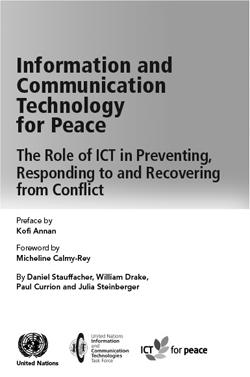| History of Foundation and F.A.Q's | |
| 1 | What is ICT4Peace? How do you define ICT4Peace? |
| 2 | Activities and programmes the Foundation is carrying out |
| 3 | Who else is involved in ICT4Peace? |
| 4 | How can I get involved in the ICT4Peace Foundation's work? |
| 5 | What is the history of the ICT4Peace Foundation? |
| 1 | Q : What is ICT4Peace? How do you define ICT4Peace? |
| A : Read our Mission Statement here. | |
| 2 | Q : Activities and programmes the Foundation is carrying out |
| A : The ICT4Peace Foundation aims to raise awareness about the WSIS Tunis Commitment and promote its practical realization in all stages of crisis management. The ICT4Peace Foundation focuses on Original research and Policy development; Advocacy on key issues; Advisory Services and Training; Targeted networking. It also looks at, inter alia:
Strategy and activities from 2007 to 2010
Objective: To enhance the competency and professionalism of the international community in crisis management through improved integrated and multi-stakeholder Peacekeeping and Peacebuilding missions as well as interagency interoperability and information sharing supported by practical collaborative frameworks and ICT tools.
|
|
| 3 | Q : Who else is involved in ICT4Peace? |
| A :
|
|
| 4 | Q : How can I get involved in the ICT4Peace Foundation's work? |
| A : If your organisation is using ICTs in an innovative way to deal with conflict management based on our understanding of and approach to ICT4Peace , we would like to hear from you. Please request for membership in our partnership network here. |
|
| 5 | Q : What is the history of the ICT4Peace Foundation? |
| A : The World Summit on the Information Society (WSIS) 2003  � �� The Declaration of Principles and Plan of Action of WSIS Phase 1 emphasized the potential of ICTs to help achieve the Millennium Development Goals of the United Nations. However, in many countries, armed conflict undermines progress towards the Millennium Development Goals. After the WSIS meeting in Geneva, Daniel Stauffacher (Chairman of the ICT4Peace Foundation, in his capacity as Ambassador of Switzerland to the WSIS) held a number of meetings including consultations with HPCR at Harvard and CMI to set up the ICT4Peace Project, with the support of the Swiss and Nowegian Governments, the Francophonie as well as private Foundations and hosted by the University for Peace, Geneva Office, as a vehicle for the promotion of ideas on ICT for conflict mitigation and peacebuilding. In 2004, the ICT4Peace Project held a series of meetings, including side meetings at:�
This process resulted in the research and publication of the report "Information and Communication Technology for Peace: the role of ICT in preventing, responding to and recovering from conflict". The ICT4Peace project, after its ground-breaking research and advocacy successes in 2005, then established itself as a Swiss Foundation in Geneva in early 2006. This Foundation will serve as a hub for research, advocacy and networking on the topic of ICT use to prevent, respond to and recover from conflict. ICT4Peace Foundation representatives also attended:
� World Summit on the Information Society 2005 The second phase of the World Summit on the Information Society occured on November 16-18 2005 in Tunis. Paragraph 36 of the Tunis Commitment states that: "We value the potential of ICTs to promote peace and to prevent conflict which, inter alia, negatively affects achieving development goals. ICTs can be used for identifying conflict situations through early warning systems preventing conflicts, promoting their peaceful resolution, supporting humanitarian action, including protection of civilians in armed conflicts, facilitating peacekeeping missions, and assisting post conflict peace-building and reconstruction." This paragraph was proposed and introduced to the WSIS negotiations by Daniel Stauffacher (Chairman of the ICT4Peace Foundation, in his capacity as Ambassador of Switzerland to the WSIS) on behalf of the Swiss Government and with the support of the Government of Tunisia, the host of the WSIS in Tunisia in 2005, and with the support and feedback of many delegations. �  � The ICT4Peace report "Information and Communication Technology for Peace - The Role of ICT in Preventing, Responding to and Recovering from Conflict " was launched at the panel hosted by ICT4Peace at the WSIS on 18 November 2005. � You can purchase this report from Amazon here. � � Panel on "ICT for Peace" at WSIS 2005 The panelists were a collection of oustanding individuals from diverse backgrounds:
The panel moderator was Hilary Bowker, former CNN anchor. The panel was chaired by Daniel Stauffacher. The report was introduced by William Drake, Paul Currion and Julia Steinberger. � Paragraph 36 was introduced to the WSIS diplomatic negotiations in 2004 by Daniel Stauffacher, Chairman of the ICT4Peace Foundation, and former Swiss Ambassador to the World Summit on the Information Society (2003 in Geneva and 2005 in Tunis), on behalf of the Swiss and Tunisian Governments for its adoption as part of the WSIS Tunis Commitment in 2005.� � The ICT4Peace Foundation was subsequently established in spring 2006 to raise awareness about the Tunis Commitment and promote its practical realization in all stages of crisis management. The ICT4Peace Foundation focuses on Original research and Policy development; Advocacy on key issues; Advisory Services and Training; Targeted networking. It also looks at, inter alia:
� In October 2006, the ICT4Peace Foundation was invited to a partnership with the UN Department of Economic and Social Affairs (DESA) and the UN Global Alliance for ICT and Development (GAID) as the focal point for overseeing and promoting the spirit of Paragraph 36 of the WSIS Tunis Declaration.�� � Key initiatives and programmes to date
|
|


